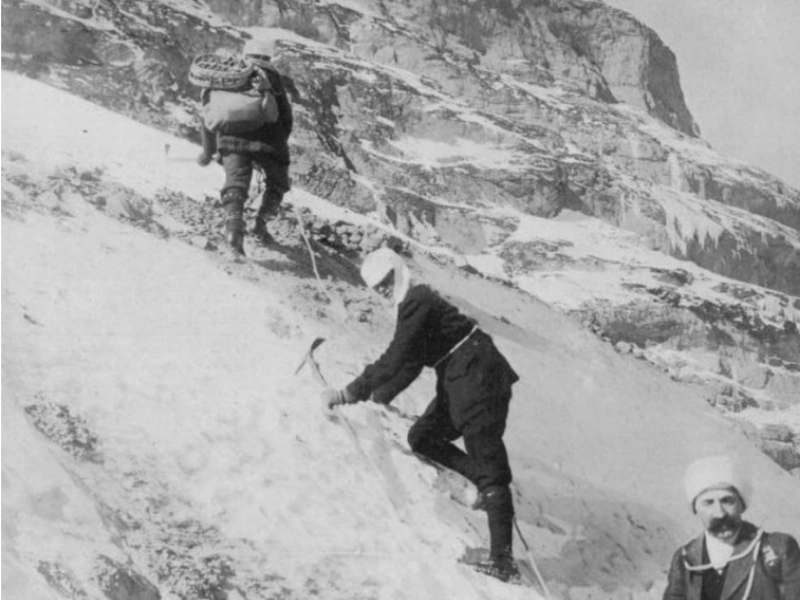Most people associate mountaineering with climbers making attempts to reach some of the highest peaks on Earth. These are frequently in remote areas, and climbing to the summit may take weeks or even months while carrying a bulky rucksack. However, the physical advantages of mountaineering are not the only health benefits.
 Because mountaineering involves walking and hiking up hills and mountains, which puts more strain on your heart to pump blood rich in oxygen to your muscles, it can enhance your cardiovascular health. It also aids in the development of endurance and strength.
In addition, mountaineering offers an amazing opportunity to make new friends and gain a fresh perspective on the world. Participating in the sport might also help you decompress. Prior to beginning a climb, it is a good idea to work on your balance and coordination because hiking will require these abilities.
Bring your left knee up to your chest and try performing a few mountain climber repetitions with your right leg. Then, to strengthen your arms and legs, incorporate push-ups in between each rep.
Because mountaineering involves walking and hiking up hills and mountains, which puts more strain on your heart to pump blood rich in oxygen to your muscles, it can enhance your cardiovascular health. It also aids in the development of endurance and strength.
In addition, mountaineering offers an amazing opportunity to make new friends and gain a fresh perspective on the world. Participating in the sport might also help you decompress. Prior to beginning a climb, it is a good idea to work on your balance and coordination because hiking will require these abilities.
Bring your left knee up to your chest and try performing a few mountain climber repetitions with your right leg. Then, to strengthen your arms and legs, incorporate push-ups in between each rep.
 Your heart, lungs, and feet will all benefit greatly from mountaineering. Engaging in this activity can elevate your heart rate and blood flow, potentially mitigating the chance of cardiovascular ailments. It will also fortify your bones and muscles. If you're not careful, though, you can end up weakening certain muscle groups and overdeveloping others. For instance, you should incorporate cross-training or balance exercises into your training if you want to climb mountains in order to prevent overdeveloping one side of your body.
By producing stress-relieving endorphins, mountaineering can enhance your sleep quality in addition to strengthening your muscles and increasing your endurance. Along with being a terrific social activity, it will allow you to spend time with like-minded people. You might even end up creating buddies for the rest of your life.
Your heart, lungs, and feet will all benefit greatly from mountaineering. Engaging in this activity can elevate your heart rate and blood flow, potentially mitigating the chance of cardiovascular ailments. It will also fortify your bones and muscles. If you're not careful, though, you can end up weakening certain muscle groups and overdeveloping others. For instance, you should incorporate cross-training or balance exercises into your training if you want to climb mountains in order to prevent overdeveloping one side of your body.
By producing stress-relieving endorphins, mountaineering can enhance your sleep quality in addition to strengthening your muscles and increasing your endurance. Along with being a terrific social activity, it will allow you to spend time with like-minded people. You might even end up creating buddies for the rest of your life.
 You spend a lot of energy when climbing, which enhances cardiovascular health and helps you burn calories. Additionally, this activity raises blood levels of high-density lipoprotein, or "good cholesterol." Your risk of heart disease has decreased.
Making new acquaintances is one of the social benefits of mountaineering. It can also help you learn how to bounce back from failure. For instance, if the weather gets poor or you run out of food or water, you might have to call off a climb.
Additionally, by increasing your self-esteem and confidence, hiking and climbing might benefit your mental health. This is due to the fact that persistence might help you reach your objectives. Exercise can also improve your thinking and facilitate learning new things.
You spend a lot of energy when climbing, which enhances cardiovascular health and helps you burn calories. Additionally, this activity raises blood levels of high-density lipoprotein, or "good cholesterol." Your risk of heart disease has decreased.
Making new acquaintances is one of the social benefits of mountaineering. It can also help you learn how to bounce back from failure. For instance, if the weather gets poor or you run out of food or water, you might have to call off a climb.
Additionally, by increasing your self-esteem and confidence, hiking and climbing might benefit your mental health. This is due to the fact that persistence might help you reach your objectives. Exercise can also improve your thinking and facilitate learning new things.
 Physical activity is a part of mountaineering, which helps build stronger bones and muscles. Additionally, it enhances cardiovascular health by augmenting blood circulation to the heart and lungs.
Exercise also improves your body's ability to withstand stress and exhaustion. This is because it raises serotonin levels, a neurotransmitter that controls mood.
The sport can be difficult, particularly at higher elevations where there is less oxygen in the air and thinner air. But you can take your time and use caution to reap the benefits without endangering your life. It's also critical to pay attention to your surroundings and be on the lookout for any potential animal risks. It's important for you to understand that climbing demands specific attributes from you, such as a great regard for the natural world, a strong drive to survive, and a calm demeanor in the face of any situation.
Physical activity is a part of mountaineering, which helps build stronger bones and muscles. Additionally, it enhances cardiovascular health by augmenting blood circulation to the heart and lungs.
Exercise also improves your body's ability to withstand stress and exhaustion. This is because it raises serotonin levels, a neurotransmitter that controls mood.
The sport can be difficult, particularly at higher elevations where there is less oxygen in the air and thinner air. But you can take your time and use caution to reap the benefits without endangering your life. It's also critical to pay attention to your surroundings and be on the lookout for any potential animal risks. It's important for you to understand that climbing demands specific attributes from you, such as a great regard for the natural world, a strong drive to survive, and a calm demeanor in the face of any situation.
 Mountaineering is a physically hard sport that also tests one's mental toughness. This is because climbing frequently elicits a wide range of feelings, including tension and anxiety. Fortunately, mountaineering can teach you how to overcome these obstacles and enhance your mental well-being.
This is due to research showing that exercise enhances cognitive functions in the brain. It causes the hippocampus, which is in charge of memory and learning, to produce new nerve cells.
Additionally, climbing compels you to engage in mindfulness exercises, which can help you focus on the here and now and lessen the effects of depression. Additionally, mountaineering facilitates the formation of close connections and new acquaintances. This is due to the high level of trust and teamwork required in mountaineering.
Mountaineering is a physically hard sport that also tests one's mental toughness. This is because climbing frequently elicits a wide range of feelings, including tension and anxiety. Fortunately, mountaineering can teach you how to overcome these obstacles and enhance your mental well-being.
This is due to research showing that exercise enhances cognitive functions in the brain. It causes the hippocampus, which is in charge of memory and learning, to produce new nerve cells.
Additionally, climbing compels you to engage in mindfulness exercises, which can help you focus on the here and now and lessen the effects of depression. Additionally, mountaineering facilitates the formation of close connections and new acquaintances. This is due to the high level of trust and teamwork required in mountaineering.